Endometritis acute and chronic: symptoms and treatment
 Endometritis is the inflammation of the inner lining of the uterus - the endometrium.This disease is a serious medical and social problem.It is endometritis that is often responsible for infertility, miscarriage, ineffective attempts of IVF.
Endometritis is the inflammation of the inner lining of the uterus - the endometrium.This disease is a serious medical and social problem.It is endometritis that is often responsible for infertility, miscarriage, ineffective attempts of IVF.
Reasons for the occurrence of
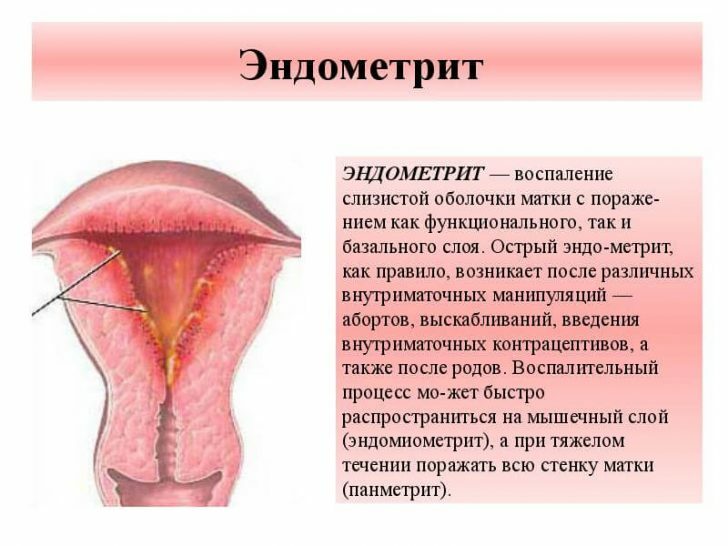
The uterus is located in the small pelvis.The main purpose of this body is the bearing of the fetus during pregnancy.
The wall of the uterus consists of 3 layers:
- Outer layer - serous( perimetry);
- Medium - Muscular( myometrium);Internal - mucous( endometrium).
- .
Endometrium is a hormonally sensitive tissue.In the premenstrual period, this layer thickens, the number of glands increases, and the blood supply of the tissue increases.All these changes are preparation for the implantation of a fertilized egg.If pregnancy does not occur, the surface layer of the endometrium is sloughed and removed with menstruation.After menstruation, the endometrium is restored due to a deep layer.
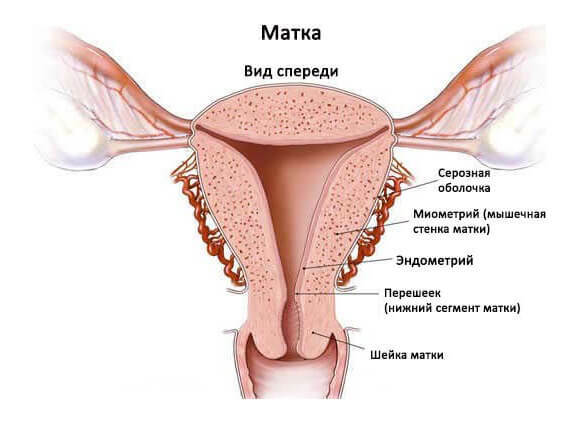
Causes of acute endometritis
The ingestion of microorganisms into the uterus provokes inflammation of the endometrium.Since the mucous and muscular layers of the uterus very closely adjoin, the inflammatory process often affects the myometrium as well - metroendometritis develops.
Causes of acute endometritis:
- Scraping the uterine cavity;
- Abortion( especially criminal abortion is often the cause of endometritis);
- Childbirth, both by natural means and by caesarean section;
- Probing the uterine cavity;
- Installation of the master spiral;
- Hysterosalpingography;
- Hysteroscopy.
There are nonspecific and specific endometritis.Development of nonspecific endometritis causes streptococci, Escherichia coli, Klebsiella, Proteus, etc.Specific endometritis is provoked by chlamydia, mycoplasma, tuberculous mycobacterium, diphtheria bacillus, gonococcus, herpes virus, cytomegalovirus, enteroviruses, toxoplasma, fungi.
Note: endometritis many women are confused with endometriosis.This is inherently two different diseases.Endometritis is an inflammatory process localized in the endometrium.Endometriosis is a non-inflammatory disease characterized by the proliferation of endometrial tissue beyond its limits.
Causes of chronic endometritis
The cause of chronic endometritis is untreated or untreated acute endometritis.The inflammatory process triggers morphological and functional changes in the inner wall of the uterus, which determines the features of the clinical picture.The frequency of chronic endometritis is approximately 14%.
The following varieties of chronic endometritis are distinguished:
- Atrophically is characterized by atrophy of glands, proliferation of fibrous tissue;
- Cystic - characterized by the formation of cysts in the endometrium;
- Hypertrophic - characterized by proliferation of the endometrium.
Symptoms of endometritis
The severity of the clinical picture of a disease depends on the duration of its existence.Thus, acute endometritis proceeds violently with a bright clinical picture.Chronic form of the disease often occurs little.
Symptoms of acute endometritis
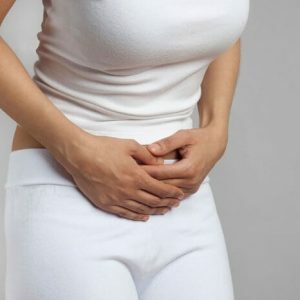 The first symptoms of endometritis occur several days after abortion, childbirth, intrauterine manipulation.The disease begins with a fever, up to 38-39 degrees, a woman feels weak and chills.There are serous-purulent or even bloody discharge from the vagina.A woman suffers from pain in the abdomen.The listed symptoms are not specific and can be observed in other inflammatory diseases.It is possible to suggest endometritis if, shortly before the onset of symptoms, any intra-uterine manipulation was performed.
The first symptoms of endometritis occur several days after abortion, childbirth, intrauterine manipulation.The disease begins with a fever, up to 38-39 degrees, a woman feels weak and chills.There are serous-purulent or even bloody discharge from the vagina.A woman suffers from pain in the abdomen.The listed symptoms are not specific and can be observed in other inflammatory diseases.It is possible to suggest endometritis if, shortly before the onset of symptoms, any intra-uterine manipulation was performed.
Symptoms of the disease persist usually up to ten days. After which several possible outcomes are possible:
- Complete cure on the background of successful therapy;
- Transition to a chronic form - in the absence or inadequately effective treatment;
- Formation of complications - in the absence of timely initiated treatment.
Symptoms of chronic endometritis
As already mentioned, the symptoms of chronic endometritis are blurred.A woman can have a prolonged high fever.There are uterine bleeding occurring in the intermenstrual period.In addition, there are permanent serous-purulent discharge from the vagina.Women are worried about periodic, rarely permanent pain in the abdomen.
Complications of
Complications of endometritis occur when untreated or untimely.Most complications are associated with the spread of infection beyond the uterus.
Possible complications:
-
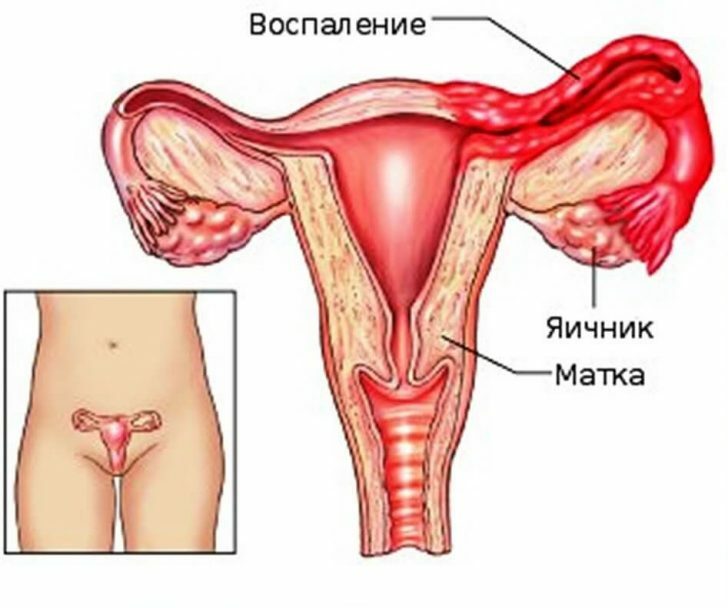 Chronic endometritis;
Chronic endometritis; - Sepsis;
- Pyometra( purulent endometritis);
- Salpingo-oophoritis;
- Pelvioperitonitis;
- Disturbance of the menstrual cycle;
- Mild pregnancy;
- Infertility;
- Adhesive disease.
Diagnosis
If you have the above symptoms, you should contact your gynecologist.The doctor will listen to complaints, clarify about the conducted intra-uterine manipulation.To confirm the diagnosis of endometritis, some research will be necessary.When palpating the lower abdomen, the doctor can determine the increase, soreness of the uterus.During an internal gynecological examination, the doctor can determine the pathological nature of the discharge according to their color, consistency, smell, and quantity.The selected smear from the cervical canal will later undergo bacteriological examination.
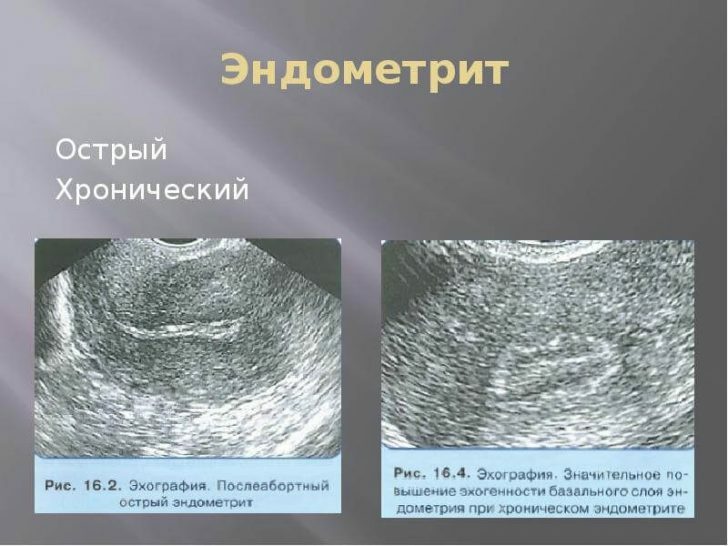
In addition, the doctor may conduct ultrasound of the uterus.During the study, a thickening of the endometrium, blood and purulent clots in the uterine cavity, remains of placental tissues, a change in the echogenicity of the myometrium is determined.In the chronic form of the disease, adhesions in the uterus can also be determined.
Treatment of endometritis
First of all, treatment begins with the appointment of etiotropic drugs: antibacterial, antiviral drugs.Antibiotics are selected taking into account the causative agent of the infection, it can be penicillins, cephalosporins, macrolides, tetracyclines.Antibiotics are often prescribed together with antifungal drugs( fluconazole, nystatin, etc.).The dosage of the medication and the duration of treatment are determined by the severity of the endometritis.If necessary, the patient is given an infusion as well as desensitizing, restorative therapy.
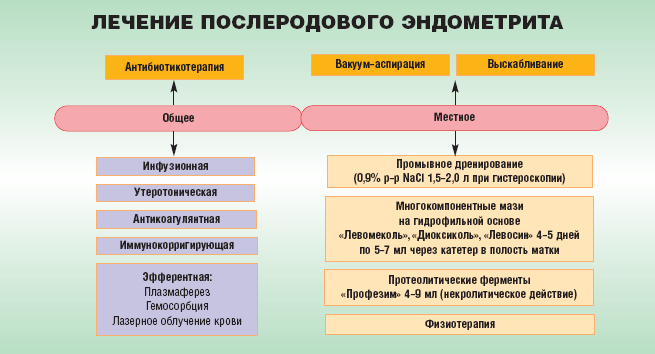
In chronic endometrium, antibiotics are also prescribed.Optimal to choose a medicine after determining the sensitivity of the causative agent of infection to a certain group of antibiotics.Often appoint a course of hormone therapy.In the case of adhesions, surgical treatment is required to remove adhesions.
With chronic endometrium, physiotherapy is successfully used: UHF therapy, laser therapy, etc.
Grigorova Valeriya, medical reviewer



